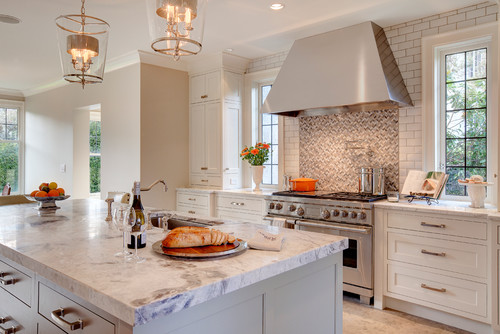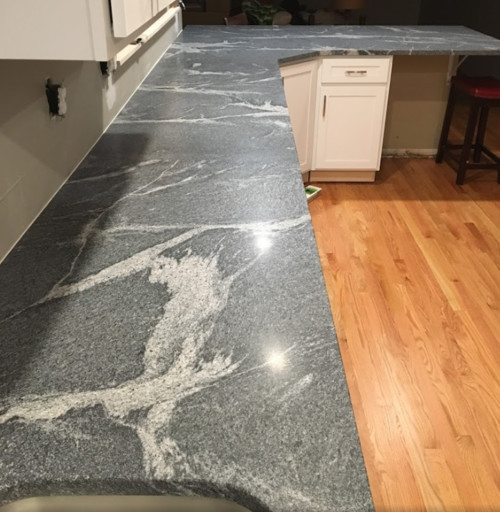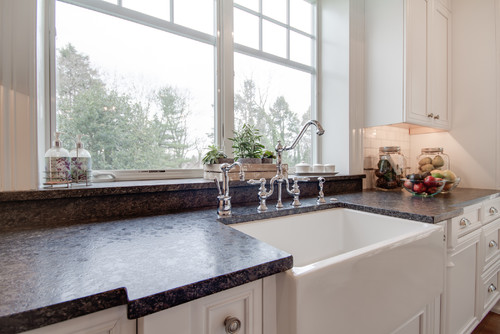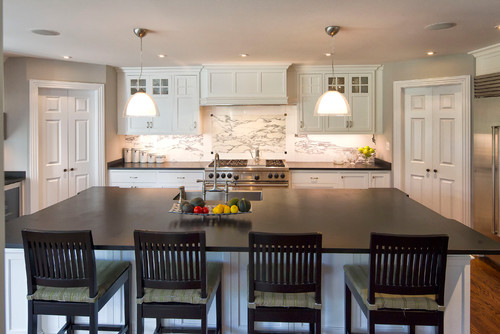Honed Granite vs Leathered Granite: How to Make the Right Choice
Honed Granite vs Leathered Granite. It’s a big choice.
When it comes to granite countertops, two of the main finish choices are honed or leathered. Both finishes have their own unique set of pros and cons, so it can be difficult to decide which one is right for your home.
What is Honed Granite?
Honed granite is a smooth, matte finish that can be achieved by polishing the stone with a fine-grit abrasive. Honed granite is less reflective than other types of granite, which can make it a good choice for areas where light is not a desired feature. One downside to honed granite is that it can show fingerprints and smudges more easily than other finishes.

What is Leathered Granite?
Leathered granite is a rough, textured finish that is achieved by using a steel brush to rough up the stone. Leathered granite has more of a natural look and feel to it than honed granite, and it can also be less slippery if it gets wet. However, leathered granite is more difficult to keep clean, as dirt and debris can get trapped in the crevices of the finish.
Pros and Cons of Honed Granite vs Leathered Granite

Honed Granite Pros (Honed Granite vs Leathered Granite)
Honed granite has a matte finish that is less reflective than other finishes
The surface is smooth, making it less likely to show fingerprints and smudges
If honed granite gets wet, it is less slippery than other finishes
Honed Granite Cons
The original color and texture of the stone can be slightly faded or muted by the honing process
Honed granite is porous and will need to be resealed every six months or so
Any scratches or scrapes will be obvious
Honed granite can stain easily

Leathered Granite Pros (Honed Granite vs Leathered Granite)
Leathered granite has a textured, natural look that can add visual interest to your countertops
The leathering process can enhance the granite’s natural color
The leathered surface is slip-resistant, making it a good choice for areas where moisture is present
Leathered granite does not show smudges and fingerprints as easily as a polished finish would.
Leathered Granite Cons
More difficult to keep clean since dirt and debris can get trapped in the crevices of the finish
Leathered granite’s non-reflective surface can make a small kitchen appear even less spacious
Maintenance of Honed Granite vs Leathered Granite
Granite is a durable material that does not require a lot of maintenance. However, it is vital to clean and seal your granite regularly in order to prevent staining.
Cleaning the Granite
When cleaning granite, it is essential to use a mild soap and warm water. Avoid using harsh chemicals or abrasive cleaners, as these can damage the surface of the granite.
Sealing the Granite
Both honed and leathered granite will need to be sealed every six months or so in order to protect the surface from stains. Use a high-quality granite sealer for the best results.

How Should I Choose: Honed Granite vs Leathered Granite?
When choosing between honed and leathered granite, it is crucial to consider the overall look you want to achieve, the level of maintenance you are willing to do, and how the granite will be used.
First, think about the overall look you want for your kitchen. If you want a more traditional look, honed granite may be the best choice. If you prefer a more modern look, leathered granite may be a better option.
Second, consider the level of maintenance you are willing to do. Honed granite will need to be resealed more often than leathered granite, and it is also more likely to show smudges and fingerprints. Leathered granite with its crevices is a bit more difficult to keep clean, but it is also less likely to show wear and tear over time.
Finally, think about how the granite will be used. If you are installing granite in an area where moisture is a concern, leathered granite may be the better choice as it won’t get as slippery. If you are installing granite in an area where you are trying to reduce brightness, honed granite may be the better option as it is less reflective.
Conclusion
No matter which type of granite you choose, be sure to use a high-quality sealer to protect the surface. Granite is a long-lasting material, but it still requires proper care and maintenance to keep it looking its best. With a little bit of effort, your granite countertops will last for many years to come.
3 comments
Comments are closed.